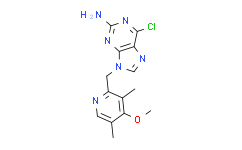BIIB021 binds in the ATP-binding pocket of Hsp90, interferes with Hsp90 chaperone function, and results in client protein degradation and tumor growth inhibition. BIIB021 inhibits tumor cell (BT474, MCF-7, N87, HT29, H1650, H1299, H69 and H82) proliferation with IC50 from 0.06-0.31 μM. BIIB021 induces the degradation of Hsp90 client proteins including HER-2, Akt, and Raf-1 and up-regulated expression of the heat shock proteins Hsp70 and Hsp27.
BIIB021 inhibits Hodgkins lymphoma cells (KM-H2, L428, L540, L540cy, L591, L1236 and DEV) with IC50 from 0.24-0.8 μM. BIIB021 shows low activity in lymphocytes from healthy individuals. BIIB021 inhibits the constitutive activity of NF-κB despite defective IκB. BIIB021 induces the expression of ligands for the activating NK cell receptor NKG2D on Hodgkins lymphoma cells resulting in an increased susceptibility to NK cell-mediated killing.
BIIB021 enhances the 体外研究 radiosensitivity of HNSCCA cell lines (UM11B and JHU12) with a corresponding reduction in the expression of key radioresponsive proteins, increases apoptotic cells and enhances G2 arrest.
BIIB021 is considerably more active than 17-AAG against adrenocortical carcinoma H295R. The cytotoxic activity of BIIB021 is not influenced by loss of NQO1 or Bcl-2 overexpression, molecular lesions that do not prevent client loss but are nonetheless associated with reduced cell killing by 17-AAG. BIIB021 is also active in 17-AAG resistant cell lines (NIH-H69, MES SA Dx5, NCI-ADR-RES, Nalm6).
Medlife has not independently confirmed the accuracy of these methods. They are for reference only.



 扫码关注公众号
扫码关注公众号